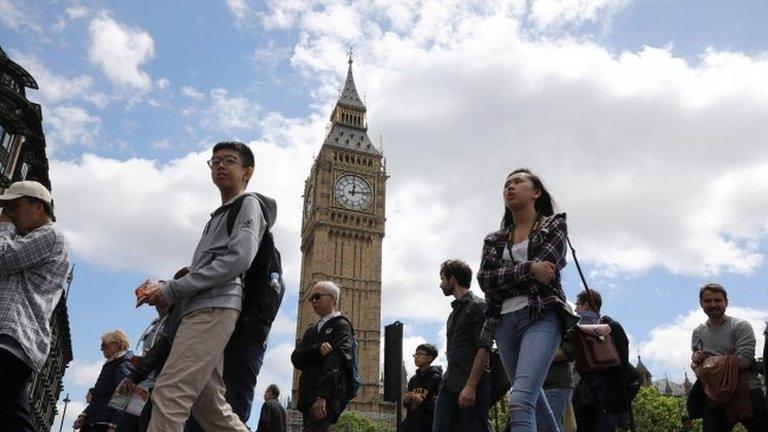General election: Northern Ireland parties to meet May
- Published
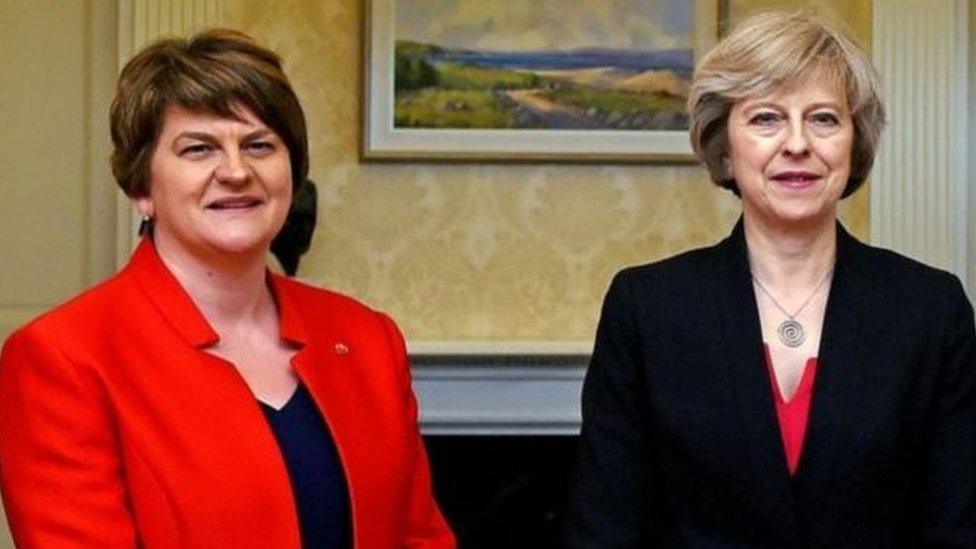
The Conservatives are having to rely on the support of 10 DUP MPs after they fell eight seats short of winning an overall majority
Northern Ireland's main parties are expected to hold talks with the prime minister in Downing Street on Thursday.
Sinn Féin, the UUP, Alliance and the SDLP will hold separate meetings with Theresa May in the afternoon.
She has already held talks with the DUP this week about a deal to support her minority Conservative government.
DUP sources have told the BBC an announcement on a deal with Tories had been delayed because of the unfolding tragedy of the Grenfell Tower blaze.
Meanwhile, Labour leader Jeremy Corbyn has demanded details of any Conservative-DUP deal, calling it a "nonsense situation".
"We want to know what is in the deal they are offering to the DUP and we want to know when it is going to be put before Parliament," he said.
Labour has confirmed that Owen Smith will be its new shadow secretary of state for Northern Ireland.
In a tweet on Wednesday evening Mr Smith said he was "honoured" to take on the role.
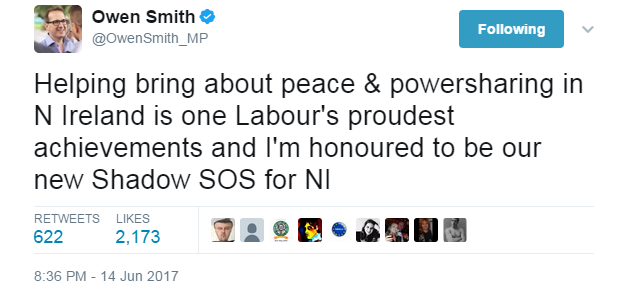
If a deal was to be delayed it would mean the Queen's Speech, which had originally been planned for next Monday, could be put back for at least a week.
It could also delay the start of Brexit talks.
The Conservatives are having to rely on the support of 10 DUP MPs after they fell eight seats short of winning an overall majority at the general election.
It means that Mrs May will remain as prime minister and the DUP MPs will be central to the survival of a Conservative Party administration.
Power-sharing questions
Ahead of her meeting in London Sinn Féin's leader at Stormont, Michelle O'Neill, said a DUP-Tory deal would not be allowed to undermine the peace process.
The MLA, who will also meet new Irish Taoiseach Leo Varadkar in Dublin on Friday, said it was imperative both governments recommitted to the implementation of the Good Friday Agreement if there was to be any prospect of re-establishing Northern Ireland's Executive.
The delegation of Sinn Féin - whose seven MPs refuse to take their seats at Westminster - is expected to include Mrs O'Neill, party president Gerry Adams and Mary Lou McDonald, the party's deputy leader and a member of the Irish parliament.
Secretary of State for Northern Ireland James Brokenshire has warned there was "very little time left" to restore a power-sharing executive at Stormont before a 29 June deadline.
"Northern Ireland's political leaders now have it in their hands to take control and shape a brighter future for everyone in Northern Ireland," he said.

What's in the deal?
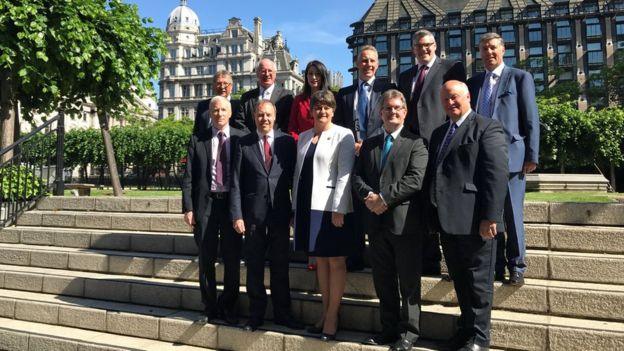
Arlene Foster and the 10 MPs Theresa May hopes will keep them in power
By BBC Northern Ireland political editor Mark Devenport
The DUP have been playing their cards close to their chest, but we know the areas they're talking about because of a DUP plan drawn up in 2015 in anticipation of a hung Parliament, external.
Things have moved on a bit since then with Brexit, but we do know they're looking at trying to lower the cost to the Northern Ireland Executive of any move on corporation tax.
They've been of the view that leaving the EU should lessen some of the stipulations in relation to state aid that were being applied by the Treasury to Northern Ireland, and that might take down the bill that the Treasury would put on the executive if corporation tax was lowered.
We know other matters, such as cutting air passenger duty and increased infrastructure spending, have been discussed, but we haven't got any sense of the exact details of the deal.
I suspect it will be top loaded with economic rather than political matters.
Some political issues, such as altering the definition of a Troubles victim or doing away with allowances for MPs who don't take up their seats, might be included.
Other legacy matters, such as protecting former soldiers or police officers from prosecution, may feature at a later stage.

The DUP has indicated its potential role at Westminster does not change its desire to restore power-sharing, and that it remains ready to form an executive without preconditions.
But the other Stormont parties have warned that any deal between the DUP and Conservatives could make restoring power sharing more difficult.
There would be very serious consequences if there was any suggestion of a back-room deal with the DUP, said SDLP leader Colum Eastwood.
"We will be asking the prime minister to be open with politicians and also with the public," he said. "Any deal struck must not hinder cross-community confidence in our politics.
"We are steadfast in our commitment to devolution and are ready to work with all willing partners to restore the devolved institutions in the interests of all our people."
Devolved government in Northern Ireland broke down in January.
The late deputy first minister, Martin McGuinness, stood down to protest the DUP's handling of an energy scandal, in a move that triggered a snap election.
'Terms and conditions'
The DUP and Conservatives were close to reaching agreement to enable Theresa May to form a minority government and the talks were not in trouble, according to DUP sources.
But they added that the London tower block fire made an announcement on Wednesday "inappropriate".
The DUP source told BBC assistant political editor Norman Smith the two parties were now finalising the "terms and conditions" of an agreement after Mrs May and DUP leader Arlene Foster met on Tuesday.
Downing Street sources told our correspondent talk of a delay in announcing a deal was "not coming from us."
- Published14 June 2017
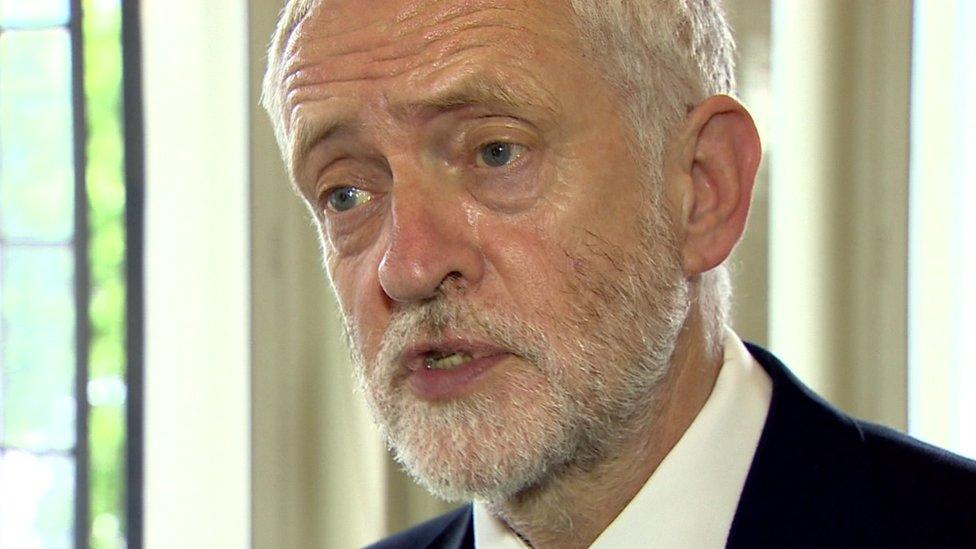
- Published10 June 2017
